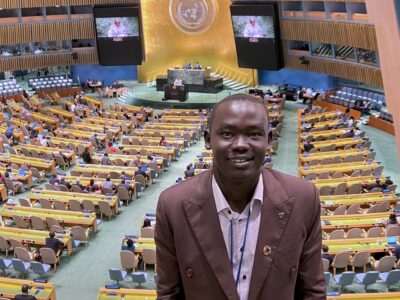
By Sruti Devendran
During Climate Week NYC, scientists, lawyers and communication specialists convened together to discuss their efforts to fight back against attacks on climate science under the current political climate. This event was jointly organized by the Sabin Center for Climate Change Law, the Sallan Foundation, Columbia’s Earth Institute and the Climate Science Legal Defense Fund. The panelists included Robin Bell, a professor at Lamont Doherty Earth Observatory; David Biello, science curator in TEDEd; Lisa Garcia, vice president of Litigation for Healthy Communities at Earthjustice; and Jeff Nesbitt, executive director of Climate Nexus. The event was moderated by New York Times science reporter John Schwartz.
The panelists discussed how they individually contributed to protecting against attacks on climate science. Former EPA administrator Gina McCarthy, who gave a keynote address at the event, was optimistic that the rules established under Obama are unlikely to be changed by the current administration unless there is a very good reason or science and facts to back it up. Biello suggested that more information about climate change would not be as effective as a well-funded effort to communicate and convince the public. Particularly noteworthy were the efforts of the organization Earthjustice, which helps protect environmental laws while keeping in mind the co-benefits to communities of color and low-income groups.
“The Trump administration is going back on every rule, thereby rolling back the rules already put forth by the Obama administration,” says Lisa Garcia from Earthjustice. (The Sabin Center for Climate Change Law, part of Columbia’s Earth Institute, keeps tabs these and other attempts to undermine science on its Silencing Science Tracker.) As a result, the environmental challenges are getting worse and worse.
Garcia said that, being the nation’s largest nonprofit environmental law regulation organization, Earthjustice helps to protect the environment through the courts. Currently they have filed more than 100 lawsuits against the Trump administration.
Serving as the vice president of litigation for healthy communities, Garcia focuses on enforcing rules that are based on sound science, in such a way as to reduce the health disparities among communities of low income and color.
In the case of a widely used pesticide named chlorpyrifos, the EPA had evidence that this pesticide was detrimental to people’s health. Poisoning from the chlorpyrifos can affect the nervous system, the cardiovascular system and the respiratory system. Prolonged exposure causes vomiting, abdominal muscle cramps, muscle twitching, tremors and weakness, and can even lead to loss of coordination. Studies also suggest that it can lead to lower birth weights. Workers, especially low income communities, are more vulnerable to this chemical as they spend more time in the fields.
During the Obama administration, the EPA moved to ban this pesticide. But the Trump administration’s EPA intervened and rejected the ban.
“They are not making rules based on solid science,” says Garcia. “Once a decision is passed saying that EPA can ignore the public health data, then it’s dangerous for things like climate science and all the other statutes.”
As the result of a lawsuit in which Earthjustice did much of the legal work, the U.S. 9th Circuit court of Appeals ruled that the EPA must finalize the ban on chlorpyrifos within 60 days. The decision was considered a victory for public health and for science in general.
“As part of the Earthjustice efforts, we are tracking these events,” says Garcia, referring to the attacks on science, “and what we find out from these cases are really important to helping protect the environment.”
Sruti Devendran is a master’s student in the Climate and Society Program at Columbia University.



